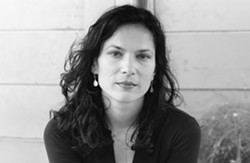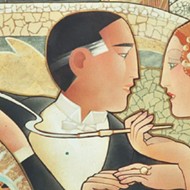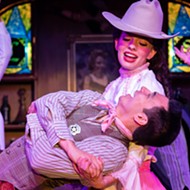A journey into darkness with Xan Cassavetes
Or, New Times' film critic geeks out with John Cassavetes' daughter
By Bryce Wilson[
{
"name": "Promo Temp Targeted",
"id": "PromoTempTargeted",
"class": "inlineCenter",
"insertPoint": "4",
"component": "15511697",
"requiredCountToDisplay": "0"
},
{
"name": "Ad - Medium Rectangle CC01 - 300x250 - Inline Content",
"class": "inlineCenter",
"insertPoint": "8",
"component": "15582119",
"requiredCountToDisplay": "12"
},{
"name": "Ad - Medium Rectangle LC01 - 300x250 - Inline Content",
"class": "inlineCenter",
"insertPoint": "18",
"component": "15582122",
"requiredCountToDisplay": "22"
},{
"name": "Ad - Medium Rectangle 9 - 300x250 - Inline Content",
"class": "inlineCenter",
"insertPoint": "28",
"component": "15582121",
"requiredCountToDisplay": "32"
}]
If you want to be a filmmaker with a name like Cassavetes, you have a serious legacy to live up to. But Xan Cassavetes, daughter of independent film legend John Cassavetes, has more than acquitted herself. Responsible for the superlative documentary The Z Channel (one of my all-time favorite films; if you haven’t seen it, rectify posthaste), Cassavetes now branches into narrative film with Kiss of the Damned, a surrealistic horror movie currently available in theaters and on demand. She took some time to talk to New Times about it over the phone.
NEW TIMES The Z Channel was a very film-literate documentary, but it didn’t feature much in the way of horror. Was horror a genre you were always interested in? Or did you come to it later?
XAN CASSAVETES Well, one associated The Z Channel with higher brow stuff, but what I also loved about The Z Channel was the stuff that wasn’t trying to belong to any sort of official intellectual definition. Kiss of the Damned is a movie that reminds me of stuff that when I was young I’d see on Z Channel, that I wasn’t supposed to be seeing on Z Channel. It’s a genre movie with adult situations and themes that mixes sexuality with an adult consciousness. I’ve always loved a lot of those European stylized horror films, more than the horror/gore thing. Though now that I’ve made this movie I’ve seen some that I think are really great. To me beautiful women and sexuality are synonymous with the vampire genre anyway. It might seem like a weird situation to go from Z Channel to this, but in my mind not so much.
NEW TIMES The film does seem to draw much more on European influences like Mario Bava and Jean Rollin. To your mind, what were the main influences on the film?
CASSAVETES Well, you just mentioned two of them, but particularly Jean Rollin. He makes these films, which are so low budget, that are on the surface … not serious, slightly exploitative. But I see Jean Rollin’s films much differently than that. I mean, when I initially started watching them, I saw that side of them, but as I got curious and started investigating the rest of his movies, there was a language from him … not necessarily visual but on an emotional level. His movies are so deeply philosophical and empathetic to his characters. Sad movies that are very beautiful that aren’t heavy-handed but have the director’s point of view throughout. A deep-set empathy, a love of women and a love of using visuals to create an alternative universe in which reality is unbridled. In those ways I really love Jean Rollin the best out of all of them. Visually, you could go on and on about who the best of the Italian or the French directors was. It never ends, the creativity and the stylization. The thing I like best about a lot of those movies is that they don’t seek to be auteur, they don’t seek to be Hollywood or pander to anything except their own creativity, their own obsession with beauty and culture—I very much love that.
NEW TIMES Surrealist horror has never been that popular in the United States. Films like Let’s Scare Jessica to Death and Messiah of Evil have always been cult items. But I notice more American horror filmmakers like Ti West, or Rob Zombie with Lords of Salem, seem to be drawing on Euro horror. What do you think is behind that?
CASSAVETES Well, the directors you mention are from a certain generation, my generation. When we were young it wasn’t as hard to see those movies. They’re beautiful movies, but they also remind me of a time where one made movies because of the necessity of exploring one’s imagination. When things become redundant it sort of defeats the purpose. There are fairytales and fables that you hear when you’re a child that stimulate your imagination, and I feel something about those European horror films that we’re discussing does the same. It piques your imagination and allows ideas to flow, images and feelings to form that can only be accessed by the imagination. I think it’s natural that people of a certain generation would draw on that. Beyond that, there is an influx of it, but I have no idea why there would be a few directors rather than none doing it now. It just makes sense to me. I mean look at Dario Argento, he makes films that aren’t, or weren’t, considered serious by his more accepted intellectual peers. But his movies are steeped in culture, opera, literature, alchemy, architecture, ballet. Rob Zombie obviously has a whole musical background. This particular format appeals to people who are interested and curious and have participated themselves in other art forms. It lends itself to music and sound, philosophy, visuals—all these things in tandem. It’s the recipe for this kind of movie.
NEW TIMES Most of your experience up to this point has been as a documentarian. Did you find it difficult to transfer to this type of narrative filmmaking?
CASSAVETES Shooting came very naturally. I was surprised how naturally and effortlessly it came. Writing the film was easy, prepping the film was a pleasure, shooting the film was very fast: three weeks. In three weeks I wrote it, three weeks I prepped it, and we shot it in 25 days. The shooting experience was unintimidating, a pure pleasure. Maybe I should have been more intimidated, but it was the joy I had always hoped to find. Editing took a long time. Creating the sound design, overseeing the soundtrack—that was the real work, period. “Do I suck?” “What am I doing?” “Is this out of control?” But those times are the best times when you’re living at 100 percent, working with the material, really just giving it everything that you’ve got physically, emotionally, and spiritually. It was harder to edit and put together this movie. Like I said, we’re dealing with so many elements in the narrative, when you take into consideration what kind of movie this is: one that depends on imagination and depends on atmosphere. It was an exploring time. Z Channel, while I wouldn’t say it wasn’t about atmosphere—it hinged on the topic of a man—it didn’t come out of my imagination; I was there to serve it. And then all the people who Jerry knew, all interesting and highly articulate people, not to mention using film clips from some of the most brilliant films of all time—that was all there for me to work with as a very solid base. Kiss of the Damned comes from my imagination 100 percent.
NEW TIMES What are your future plans—would you like to split your career between documentaries and narrative films? And would you ever make a horror film again?
CASSAVETES The answer to all of that is I don’t know. There is another story I want to tell that’s narrative. But I love documentaries. I’m very sad that I didn’t get to make my documentary about Nic Roeg and Ken Russell before Ken Russell passed. Two of my very favorite filmmakers in the world. You know, I’m not planning on making a horror film next, but I certainly love the freedom and imagination that it takes. It’s a great place to work. I don’t know, I try to keep an open mind. The older I get, the less rigid I aim to be. I have no idea where my path is taking me, but I’m waiting with open arms.
New Times contributor Bryce Wilson is the author of Son of Danse Macabre, a personal history of the last 30 years of horror, available for Nook and Kindle for $2.99. Contact him via Arts Editor Anna Weltner at [email protected].










